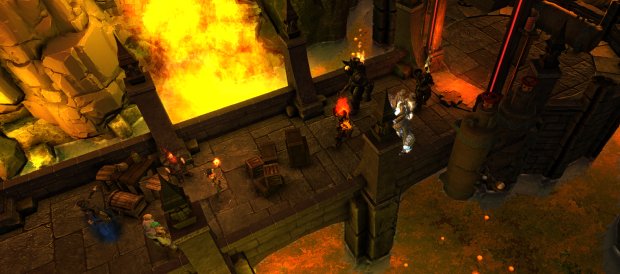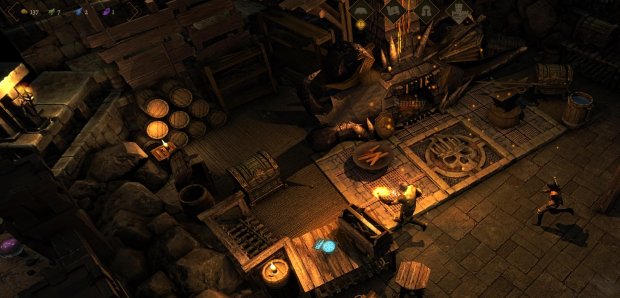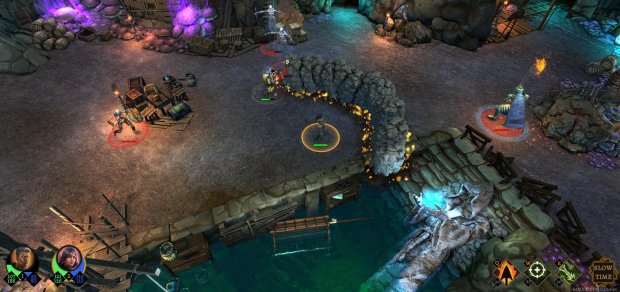Interview: Tower Of Time developers talk ambition, player feedback, and the ancient real-time wars
Real-good-time
Tower Of Time [official site] was a tremendous surprise - an early access RPG, from first-time developers, with a unique real-time combat system. That's all three strikes, surely? Except no, it's really fantastic. Having finished the first floor of the tower, what's available for now, I wanted to find out more about how an unknown team from Poland were so audacious as to try (so successfully) at such a project. So I spoke to Krzysztof Monkiewicz, the project's lead, to find out how they got started, and where they're going next.
RPS: Can you tell us a bit about the team behind Tower Of Time? How many of you are there, and what have people worked on before?
Krzysztof Monkiewicz: At the moment we include ten full-time people. During development we contracted a few other freelancers for music, SFX and modelling of characters and environment. The team had experience with several games before, but there were not really any AAA titles. For me, more important than proven experience with large productions was the personality. I was looking for people who are creative, willing to take an active part in the development and not afraid of thinking outside the box. Whether it was a good call – only time will tell, but so far I am very happy with the initial feedback.
RPS: Tower Of Time seems an enormous project for a debut game. Making an RPG is a big enough task, but making one with a new approach to combat - well, that's crazy. How did you decide to start trying?
Monkiewicz: That is utterly crazy, I fully agree. When I announced to my friends that I wanted to leave my previous job (completely different industry) and start in game development, they questioned my mental integrity. However, that was always my dream – to find a way to share my ideas and create games that players will actually want to finish.
As for the scope of the game and genre – I realized we could either start small, create a game that would be a clone of another successful game and hope that it will somehow stand out from the swarm of other indie games, or take a risk and do something large and new. It wasn’t a tough decision for me – I took the risk.
RPS: So what other types of combat did you consider when you were developing? How did you arrive on this hybrid of real-time strategy and BioWare-style fights?
Monkiewicz: I’ve played a lot of RPGs in my life. I started very early with Dungeon Master, Might and Magic and the Wizardry series and have been through (I think) every single RPG that was noteworthy since then. One thing that always bothered me was combat mechanics. Usually, from mid-game you already have a party that can handle every challenge easily, turning combat into more of a chore rather than keeping it fun.
My goal was to create combat mechanics which would challenge the player until the very end and where the tactics and party preparation are far more important than the equipment. The only way I could think of to achieve that goal was to make it a dynamic real-time combat system with a certain degree of randomness. I love turn-based RPGs, don’t get me wrong – my favorite RPG game of all time is Divinity: Original Sin – but I think that turn-based games put too much of a constraint on the developer, as each encounter needs to be carefully pre-defined to make it both winnable and yet still challenging. Since players’ skillsets cover a broad range, it is difficult to balance it in a way that accommodates everyone’s expectations.
RPS: You say your primary reason for using Early Access is to test and tweak the combat. How is that going so far? Have you had much useful feedback?
Monkiewicz: This is going great. Honestly, we did not expect that players would be so engaged with the game already at this stage. Whenever I have the time, I am observing how players play – to see how they approach certain challenges we throw at them – this is an invaluable input for me. We also have gotten a massive amount feedback so far (and it is still coming), both on game discussion boards and via email. What surprised me is how well structured the feedback we get is. It is not a single comment here and there – but instead we receive carefully constructed analyses, pinpointing issues and giving suggestions on how to improve them. Adding an in-game option to report issues and offer suggestion was also a great idea coming from the team. We get save data and game logs, which allow us to pinpoint the issue immediately and fix it very quickly. We are continuing to work on the next part of the game, but our development pipeline for the next month concerning combat and ‘quality of life’ features is mostly about how to incorporate players’ feedback.
RPS: But were you worried at all, did you see the risks with using Early Access for an RPG?
Monkiewicz: Yes, Early Access for RPG is quite risky. Who would want to buy an RPG game that is not finished? However, about three months ago when we finished our core combat mechanics and started testing it with friends and family, to my horror, I saw that out of ten non-project people playing, each played the combat differently. We designed the mechanics behind the system following the principle that on harder difficulties you should think outside of the box – but such creativity surprised me to be honest. So, I decided to package what we had finished into Book One – which is polished, has a contained story and can offer a decent amount of gameplay and then release it – hoping that players would not frown upon this approach.
RPS: Even in response to our own coverage of the game, there's been a bit of hostility from some readers to the real-time combat, as if it's breaking some sort of rule to do RPG combat without a pause. Has that response surprised you?
Monkiewicz: Yes, it has surprised me greatly. We have unwittingly stumbled into a hidden war that apparently has been raging since the dawn of time – between the advocates of Turn-Based Combat and of Real-Time with Pause - that I knew nothing about. RPS is one example, and there are some quite heated discussions on few other forums as well. I can understand that, for some players, replacing pause with slow time would be seen as an attempt to come up with something new at any cost, or an attempt to cover up flaws in the combat AI.
For us, it is the opposite – we want to enhance the experience. In my opinion, slow time does not kill the dynamism as much as pause does. When you see a raging fireball of doom flying very slowly towards your party and you manage to move them just in time, it is a good feeling. As for our AI, this is an entirely different topic. We have the core of a system that we are quite happy with and will continue to develop it further. We have some of it already implemented in the latest build. One simple example perhaps: when your champion faces range enemies, if you move him/her behind a wall (or create one), the enemies do not walk the shortest path to your champion, usually putting them in melee range, but instead look for the tactically optimum position, ideally trying to keep as long range as possible.
In any case, creating a game which is controversial (and rides a wave of notoriety as a marketing trick) was not my goal. We added a section to our Steam page, "Before You Buy", where we advise the players to take a look at our combat mechanics first, to make sure they will not be unhappy with the combat portion of the game.
RPS: What's your ambition for the game? Do you see it as an experiment, or perhaps the start of a series?
Monkiewicz: My main ambition for this game is to create a brand for Event Horizon - as a developer who is not afraid to try something fresh and that also will deliver on its promises. We are coming from nowhere and do not have any good references behind us. Whether we succeed or not, only time will tell.
As for the future plans – Tower of Time’s story, although it might start with a typical fantasy genre, is definitely not that, as we will hopefully prove later on. The ending of the game should create a good ground for Tower of Time 2, which will take place a few hundred years later.
I also have two other ideas, which of course will depend on availability of resources. One is a separate Tower of Time Arena - where we will further enhance our party-based real-time combat with fog of war and slow-time to offer a PVP experience. The second idea is something entirely different. One of the best games I ever played is Master of Magic. I dream about creating something similar in the future, set in the world of Artara, where magic meets technology with devastating consequences.
RPS: Thank you for your time.







